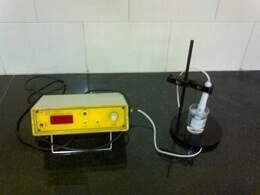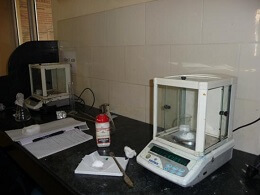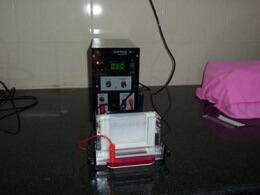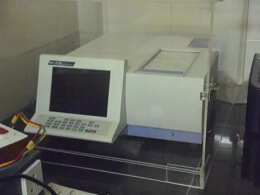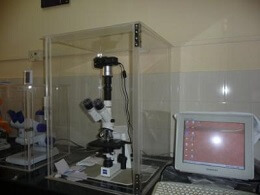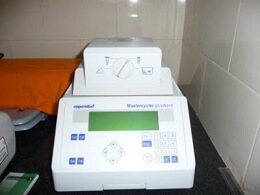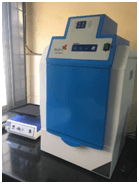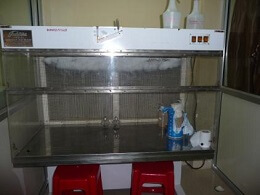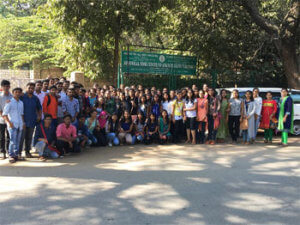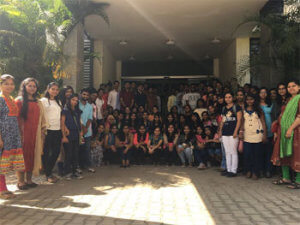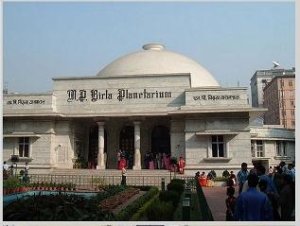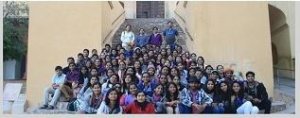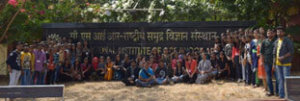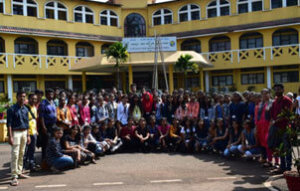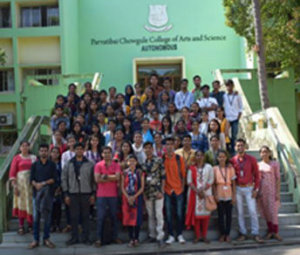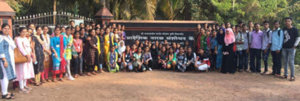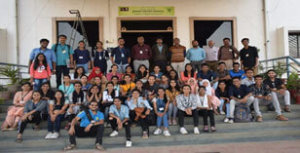Department of Biotechnology
The Department of Biotechnology was established in the year 2004 as an institution offering graduate courses in Biotechnology. The College also started Post Graduate course in the academic year 2008. We have 09 faculty members and vibrant graduate and postgraduate student strength of over 100.
Department teaches about on various streams of Biotechnology and multidisciplinary sciences: molecular biology, cell biology, genetics, neuroscience, biophysics, bioinformatics, environmental biotechnology, biostatistics, and medical microbiology.
Our students conduct research under the supervision of their supervisor with an aim to engage them in the processes of intellectual inquiry, problem solving and creative thinking.
Admission to these degree programs is on meritorious base and according to role of University of Mumbai.
Consultancy Services: (If any) – Electrophoresis of protein and DNA samples.
Lab Information Details
Laboratory-I (Biotechnology):
Total area in square feet: 44ft. X 34 ft.
Laboratory-II (Biotechnology):
Total area in square feet: 28ft. X 21ft.
Instrumentation Room:
Total area in square feet: 34ft. X 14ft.
Equipments
1. Refrigerator
2. Colorimeter
3. Electronic balance
4. pH meter
5. Homogenizer
6. Electrophoresis Apparatus
Research Equipments
1. Laminar air flow cabinet
2. Inverted Microscope
3. Carl Zeiss Phase contrast microscope
4. PCR machine
5. UV – Vis Spectrophotometer
6.Gel Documentation System
7.Gel Rocker
8.FTIR Machine
Research Equipments
Teaching
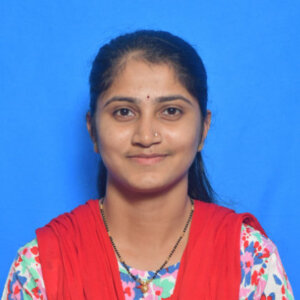
Ms. Lad Dhanashri Ashok
Assistant Professor
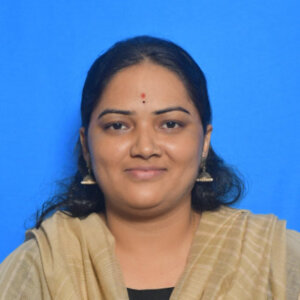
Ms. Yadav Surabhi Jasman
Assistant Professor
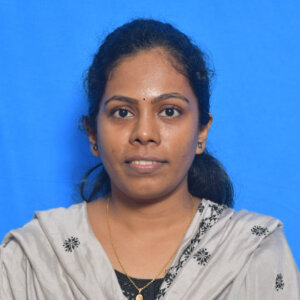
Ms. Ghadi Vibhavari Anant
Assistant Professor

Mr. Bhagwat Siddhesh Santosh
Assistant Professor
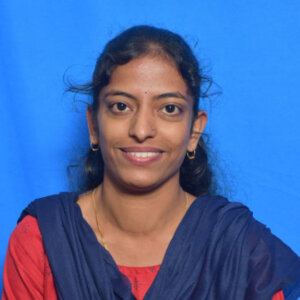
Ms. Narkar Najuka Santosh
Assistant Professor

Mr. Panchal Shubham Naresh
Assistant Professor

Ms. Bhave Rashmi Anil
Assistant Professor
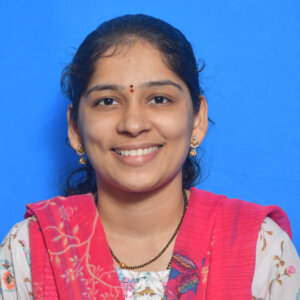
Ms. Navathe Amruta Anand
Assistant Professor
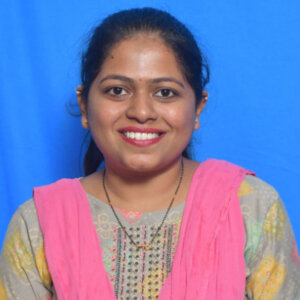
Ms. Shinde Samidha Suresh
Assistant Professor
Non Teaching
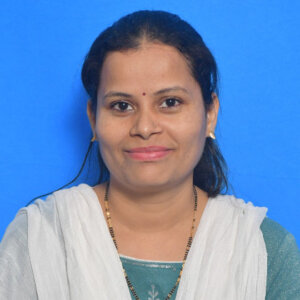
Mrs. Pilankar Sonali Shridhar
Laboratory Assistant

Mr. Shivalkar Tarachand Shashikant
Peon

Mr. Ghosalkar Mahesh Prabhakar
Peon
UG
| Class and Semester | Course Nomenclature | Course Type |
|---|---|---|
| F. Y. B. Sc. Semester I | Fundamentals of Biotechnology – I | Major Subject |
| Introduction to Microbiology | Major Subject | |
| Basic Chemistry – I | Minor Subject | |
| Basic Chemistry – II | Minor Subject | |
| Traditional Biotechnology | IKS | |
| Biostatistics | SEC | |
| English: Communication Skills – I | AEC | |
| Environmental Education – I | VEC | |
| F. Y. B. Sc. Semester II | Cell Biology and Microbiology | Major Subject |
| Biochemistry – Concept of Biomolecules | Major Subject | |
| Basic Chemistry – III | Minor Subject | |
| Basic Chemistry – IV | Minor Subject | |
| Bio-analytical Techniques | SEC | |
| English: Communication Skills - II | AEC | |
| Environmental Education - II | VEC | |
| S. Y. B. Sc. Semester III | Genetics | Major |
| Immunology | Major | |
| Physiology | Major | |
| Applied Chemistry – I | Minor | |
| Applied Chemistry – II | Minor | |
| Molecular Diagnostics | SEC | |
| S. Y. B. Sc. Semester IV | Molecular Biology | Major |
| Bioprocess Technology | Major | |
| Medical Microbiology | Major | |
| Applied Chemistry – III | Minor | |
| Applied Chemistry – IV | Minor | |
| Bioinformatics | VSC | |
| T. Y. B. Sc. Semester V | Cell Biology | Compulsory |
| Medical Microbiology and Instrumentation | Compulsory | |
| Genomes and Molecular Biology | Compulsory | |
| Marine Biotechnology | Compulsory | |
| Applied Component - Biosafety | Compulsory | |
| T. Y. B. Sc. Semester VI | Biochemistry | Compulsory |
| Industrial Microbiology | Compulsory | |
| Pharmacology and Neurochemistry | Compulsory | |
| Environmental Biotechnology | Compulsory | |
| Applied Component - Agribiotechnology | Compulsory |
PG
| Class and Semester | Course Nomenclature | Course Type |
|---|---|---|
| M. Sc. I Semester I | Biochemistry | Major Mandatory |
| Bioprocess Engineering and Technology | Major Mandatory | |
| Basics in IPR and Patents | Major Mandatory | |
| Immunology | Major Elective | |
| Molecular Diagnostics | Major Elective | |
| Research Methodology | Compulsory | |
| M. Sc. I Semester II | Bioinformatics and Biostatistics | Major Mandatory |
| Plant and Animal Biotechnology | Major Mandatory | |
| Patenting in Biotechnology and Bioethics | Major Mandatory | |
| Bio Entrepreneurship | Major Elective | |
| Bioanalytical and Biophysical Techniques | Major Elective | |
| M. Sc. II Semester III | Applied Virology and Microbiology | Major Mandatory |
| Environmental Biotechnology | Major Mandatory | |
| Scientific Writing | Major Mandatory | |
| Biologics and Regulatory Affairs | Major Elective | |
| Drug Discovery and Clinical Studies | Major Elective | |
| M. Sc. II Semester IV | Nanobiotechnology | Major Mandatory |
| Molecular Enzymology and Enzyme Technology | Major Mandatory | |
| OMICS and Systems Biology | Major Elective | |
| Food Biotechnology | Major Elective |
Programme & Course Outcome
Program Specific Outcomes
UG Biotechnology
To impart hands on skills in preparation of Buffers and solutions.
To impart skills in handling the cultures of micro – organisms
To impart the knowledge of molecular biology techniques.
To impart the skills of PTC, ATC and Science communication
To impart knowledge of society and make students aware about the Problems in Society.
To understand basic principles of research methodology and identify a research problem.
To gain critical thinking and analytical skills to understand new diagnostic methods.
To write a business plan.
To design strategies for successful implementation of ideas.
PG Biotechnology
To develop the knowledge of Biochemistry, Molecular Biology, Bioprocess Technology.
To impart the knowledge of Bioinformatics and Biostatistics.
To impart the research values among the students.
Course Outcome
| Class | Course code | Course Outcomes |
|---|---|---|
| F. Y. B. T. | USBT101 | To be able to relate the applications and benefits of Biotechnology in the fields of agriculture, livestock, human health and environment and to discuss the basics of fermentation. |
| USBT102 | To understand the role of sterilization and disinfection in the field of Microbiology and to develop skills towards use of microscopy and staining techniques. | |
| USBT104 | To develop an understanding of chemical bonds and to be able to differentiate between chiral and achiral molecules and different enantiomers. | |
| USBT105 | To develop skills towards use of titrimetric and gravimetric analysis and to impart knowledge and hands on experience of the various practicals related to titrimetric and Gravimetry. | |
| USBT106 | To impart the knowledge and history of traditional Biotechnology and to explore the research institutes related to Biotechnology in India. | |
| USBT107 | To gain insights about the use of statistics in the field of Biotechnology and to apply the various statistical tools for analysis of biological data. | |
| USBT108 | To develop an understanding of communication skills required to excel in real work environment and corporate life and to gain insight into technical and non-technical qualities in career planning. | |
| USBT109 | To develop an understanding of the structure and functioning of the ecosystems and to gain insights about the concept of pollution, climate change and sustainable development. | |
| USBT201 | To discuss the ultrastructure, function and location of organelles in prokaryotic and eukaryotic cells and to gain insight into the basics of virology. | |
| USBT202 | To discuss the basics of carbohydrate and lipid biochemistry and to learn about fundamental structures and functions of amino acids and proteins. | |
| USBT204 | To develop an understanding of thermodynamics and to learn about reaction kinetics and order of reaction. | |
| USBT205 | To gain insight into the details of oxidation – reduction reactions and to develop an understanding of enzymology. | |
| USBT207 | To develop skills towards the principle, working and applications of different analytical techniques and to impart knowledge and hands on experience of the various practicals related to bio-analytical techniques. | |
| USBT208 | To learn about leadership, ethical values, capacity building, team building, decision making and to learn about the understanding of stress and management of stress. | |
| USBT209 | To understand the relevance of renewable energy sources and conservation of biodiversity and to study the applications of different life forms in environmental remediation. | |
| S. Y. B. T. | USBT301 | To develop an understanding of fundamental concepts of Mendelian genetics and to discuss the different processes in microbial genetics and their role in mapping genes. |
| USBT302 | To familiarize learners with the immune effector mechanisms and to provide the information about cell receptors. | |
| USBT303 | To gain insights into the physiological processes of plants and functions of plant growth regulators and to develop a comprehensive and deep understanding of the vital physiological processes of animals. | |
| USBT305 | To develop an understanding of the different aspects of Organic Chemistry and to discuss the role of organic compounds in Biology and synthesis of organic compounds. | |
| USBT306 | To develop skills towards preparation of standard solutions in the laboratory and understand the role of buffers and to explore the fundamentals of green chemistry and synthesis. | |
| USBT307 | To learn and understand the molecular techniques and to provide the importance of techniques in diagnosis. | |
| USBT401 | To have an insight into mechanism of gene expression and to provide the knowledge about regulation of gene expression. | |
| USBT402 | To understand the basic skills applied in fermentation technology and to build a foundation for more advanced studies in bioprocess technology. | |
| USBT403 | To gain insight into disease factors and processes and provide the knowledge about diseases caused by microorganisms. | |
| USBT405 | To develop an understanding of the different aspects of Analytical Chemistry and to gain an understanding of basic concepts in Polymer Chemistry. | |
| USBT406 | To gain knowledge of natural product chemistry and related acquired skills and to gain an understanding of basic concepts in nanotechnology. | |
| USBTV407 | To develop an understanding of introduction to computers and biological databases and to develop an understanding of BLAST and sequence alignment. | |
| T. Y. B. T. | USBT501 | To impart the knowledge of cell biology |
| USBT502 | To impart the knowledge of Medical Microbiology and Instrumentation | |
| USBT503 | To impart the knowledge of Genomes and Molecular Biology | |
| USBT504 | To impart the knowledge of Marine Biotechnology | |
| USBT505 | To impart the knowledge of Biosafety practices | |
| USBT601 | To impart the knowledge of Biochemistry | |
| USBT602 | To impart the knowledge of Industrial Microbiology | |
| USBT603 | To impart the knowledge of Pharmacology and Neurochemistry | |
| USBT604 | To impart the knowledge of Environmental Biotechnology | |
| USBT605 | To impart the knowledge of Agribiotechnology | |
| M. Sc. I | PSBT101 | To impart the knowledge of glycobiology and membrane biochemistry; to provide the insight of protein transport and membrane trafficking; To gain the knowledge of nucleic acids biochemistry; to have a firm foundation in bioenergetics and regulation of metabolism. |
| PSBT102 | To impart the knowledge of basic principles of biochemical engineering, to provide the insight of production of proteins from recombinant, To gain the knowledge of applications of enzyme technology in food processing, To have a firm foundation in applications of microbial technology. | |
| PSBT103 | To impart the knowledge of the introduction of IPR and to provide the insight of basics of patents. | |
| PSBT106 | To gain the knowledge of vaccinology and to have a firm foundation in antigen – antibody interactions. | |
| PSBT108 | To impart the knowledge of diagnostic microbiology and to have a firm foundation in functional genomics and proteomics. | |
| PSBT201 | To impart the knowledge of basics of Bioinformatics and DNA sequence analysis, to provide the insight of multiple sequence alignments and protein modelling, to gain the knowledge of the various concepts of Biostatistics. | |
| PSBT202 | To impart the knowledge of plant tissue culture, to provide the insight of plant genetic manipulations, to gain the knowledge of animal cell culture and animal reproductive Biotechnology; to have a firm foundation in molecular mapping and marker assisted selection. | |
| PSBT203 | To impart the knowledge of patenting and to provide the insight of bioethics. | |
| PSBT206 | To gain the knowledge of innovation and entrepreneurship, to have a firm foundation in business strategies, to provide the insight of finance and accounting. | |
| PSBT208 | To impart the knowledge of microscopic techniques, to provide the insight of chromatography, to gain the knowledge of HPTLC principles and instrumentation, to have a firm foundation in spectroscopy. | |
| M. Sc. II | PSBT301 | To gain insights into latest development of diagnostics and therapeutics for such diseases; to understand epidemiological principles in prevention, control and management of pandemic disease; to acquire understanding of antimicrobial resistance for management of drug resistance in population; to understand the different aspects of biofilm and their management. |
| PSBT302 | To acquire understanding of the various concepts related to air pollution and air pollution monitoring; to gain insights into the various concepts related to soil pollution and solid waste management; to impart the knowledge of water pollution and different strategies of waste water treatment; to gain insights into the biodiversity concepts, data management and environmental monitoring. | |
| PSBT303 | To think critically, organize and analyze scientific data; understand the best practices of scientific writing by adhering to research ethics and by avoiding plagiarism; to develop advanced scientific writing skills to write research articles, reviews, thesis and proposals and to make oral, poster or power point presentations. | |
| PSBT306 | To be familiar with the basic concepts and significance of biologics/biosimilar in addition to having knowledge about its therapeutic applications; to be knowledgeable in the steps involved in the production of biologics/ biosimilars; to be aware of the protocols/ techniques required for characterization of the biosimilar relative to the reference biologic; to acquaint with the regulatory aspects of approval of biologics and biosimilars. | |
| PSBT307 | To learn about clinical research informatics in drug discovery and design pathway using some in silico tools; to understand the clinical trial design set up and gain information on rules-regulation and responsibilities in clinical studies; to gain insights into the various concepts, scope and purpose of pharmacovigilance; to impart the knowledge of data management in clinical research. | |
| PSBT401 | To impart the knowledge of a general and broad introduction to multidisciplinary field of nanotechnology; to be familiarize with the synthesis of nanomaterials; to understand the basic science behind the properties of nanomaterials and the principles behind advanced experimental techniques for studying nanomaterials; to understand the different aspects and applications of nanomaterials. | |
| PSBT402 | To be aware of the enzyme kinetics, the catalytic power of an enzyme, changes in the active site and the importance of the transition state. The importance of obtaining enzymes in their pure form and the ways it can be achieved; to get insights into the need for and methods for enzyme engineering to enhance its activity or half-life; to impart the knowledge of the industrial and medical applications of enzymes; to be aware of the significance of enzymes as diagnostic tools, in therapy, industrial application and as biosensors and the outcome of enzyme deficiencies. | |
| PSBT405 | To be aware of the concepts and strategies of the emerging fields of OMICS; to understand, compare and contrast the techniques involved and applications of genomics, proteomics, transcriptomics, lipidomics and metabolomics, to impart the knowledge of the structure and dynamics of a system as a whole and apply the different approaches to study systems biology by top down and bottom up approach; to gain insights into the concepts of knowledge discovery process and data mining methods; applications of systems biology. | |
| PSBT406 | To impart the knowledge of nutraceuticals and functional foods; to gain insights into Food Biotechnology in management of health and disease. |
Seminar Workshop Organized(Last 5 years)
Internships in Gadre Marine Export Pvt. Ltd., Ratnagiri; TJ Marine products Pvt. Ltd., Ratnagiri
Workshop cum training on “Applications of Bioinformatics” organized by Department of Biotechnology, Gogate – Jogalekar College, Ratnagiri on 5th March, 2019.
Workshop cum training on “Applications of Bioinformatics” organized by Department of Biotechnology, Gogate – Jogalekar College, Ratnagiri on 6th March, 2019.
Organized “Health Awareness Lecture” delivered by Dr. Saroj Bolde, Associate Professor, Grant Government Medical College, Mumbai on 12th July, 2019.
Workshop cum training on “Applications of Bioinformatics” organized by Department of Biotechnology, Gogate – Jogalekar College, Ratnagiri on 25th Feb., 2020.
Workshop cum training on “Applications of Bioinformatics” organized by Department of Biotechnology, Gogate – Jogalekar College, Ratnagiri on 26th Feb., 2020.
Workshop cum training on “Applications of Bioinformatics” organized by Department of Biotechnology, Gogate – Jogalekar College, Ratnagiri on 5th and 6th Feb., 2021.
Workshop cum training on “Applications of Bioinformatics” organized by Department of Biotechnology, Gogate – Jogalekar College, Ratnagiri on 14th and 15th Jan., 2022.
Organized Career Guidance programme for 106 students from Abhyankar – Kulkarni Junior College, Ratnagiri on 16th Nov., 2019.
Organized a webinar titled “Ageing: Promoting health and functioning in older persons” in association with Indian Women Scientists’ Association, supported by BRNS-DAE on 6th Dec., 2021.
Organized a Har Ghar Tiranga – Cleanliness programme at Department of Biotechnology, GJC, Ratnagiri on 13th August, 2022.
Organized Career Guidance programme for 12th Science students from Abhyankar – Kulkarni Junior College, Ratnagiri on 14th Oct., 2022.
Collaboration with other Institutes
Smt. Parvatibai Chowgule College, Margao, Goa
MoU Activities
- Our department visited Chowgule College, Madgaon for discussing the new ideas applicable for the curricular and extra – curricular activities on 23rd January, 2019.
- One staff member (Mr. Shubham N. Panchal) Participated in Regional workshop on Research Based Pedagogical Tools held in Parvatibai Chowgule College of Arts and Science, Gogol – Margao, Goa from 5th to 7th March, 2020.
- Three staff members (Miss. Rashmi A. Bhave, Miss. Mrudula M. Nimkar and Mr. Shubham N. Panchal) participated in online webinar session on “ICT Enablement in Higher Education for the Betterment for Academic content delivery and statutory adherence – NAAC Preparedness” conducted by Parvatibai Chowgule College of Arts and Science, Gogol – Margao, Goa on 4th June, 2020.
Academic Extension & Photograph, MOU activities related information & Photographs, Research collaborations.
1. Avishkar State level Inter-University Research Festival
2. NSS and NCC
3. Industrial visit
1.06 UG students participated in Physico – Chemical parameters testing of fish meal, fish oil, and fish soluble paste in Fish Processing Plant, TJ Marine Pvt. Ltd., Ratnagiri from 10th May to 15th May, 2019
2.25 T. Y. Biotechnology students were participated in Value Added Course – Bioanalytical Techniques organized by Department of Biotechnology from 10th June to 15th June, 2019.
3.39 S. Y. Biotechnology students were participated in Value Added Course – Biophysics organized by Department of Biotechnology from 15th – 20th and 22nd – 25th July, 2019.
4. Mr. Bosco Bothelo from T. Y. Biotechnology has completed “Python – A Beginners guide towards Python programming” online course using Udemy on 8th Sept., 2020.
5. 37 T. Y. Biotechnology students were participated in Value Added Course – Bioanalytical Techniques organized by Department of Biotechnology from 7th Sept. to 12th Sept., 2020
6. 31 F. Y. Biotechnology students were participated in Value Added Course – Staining Techniques organized by Department of Biotechnology from 16th to 21st Sept., 2019.
7. 27 S. Y. Biotechnology students were participated in Value Added Course – Biophysics organized by Department of Biotechnology from 14th – 19th and 21st – 24th Sept., 2020.
8. 26 F. Y. Biotechnology students were participated in Value Added Course – Staining Techniques organized by Department of Biotechnology from 23rd to 28th Nov., 2020.
9. 27 students of S. Y. Biotechnology were participated in “Online Workshop cum training on Applications of Bioinformatics” organized by Department of Biotechnology on 5th and 6th Feb., 2021.
10. 28 T. Y. Biotechnology students were participated in Value Added Course – Bioanalytical Techniques organized by Department of Biotechnology from 5th to 10th July, 2021.
11. 22 S. Y. Biotechnology students were participated in Value Added Course – Biophysics organized by Department of Biotechnology from 5th – 10th and 12th – 15th July, 2021.
12. 29 F. Y. Biotechnology students were participated in Value Added Course – Staining Techniques organized by Department of Biotechnology from 4th to 9th Oct., 2021.
13.22 students of S. Y. Biotechnology were participated in “Online Workshop cum training on Applications of Bioinformatics” organized by Department of Biotechnology on 14th and 15th Jan., 2022.
14. Bosco Bothelo, Aishwarya Harwande, Aneeqa Kazi, Dhanashri Lad, Najuka Narkar, Nameera Khadas, Nida Chougle, Pranali Dayalkar, Priti Ambre, Shruti Kinare, Siddhi Loke, Sonal Sakpal, Swara Prasade, Uzma Mulla from M. Sc. II Biotechnology completed “Industrial Biotechnology” online course using Coursera in January, 2022.
15. Bhakti Pawaskar, Komal Ghadigaonkar, Shivani Pawar, Siddhi Lingayat, Venu Rane from M. Sc. II Biotechnology completed “Algae Biotechnology” online course using Coursera in January, 2022.
16. Anirudha Dandekar, Tejashree Kadam from M. Sc. II Biotechnology completed “The Science of Stem Cells” online course using Coursera in January, 2022.
17. Sayali Kuvalekar from M. Sc. II Biotechnology completed “Stanford Introduction to Food and Health” online course using Coursera on 27th January, 2022.
18. Komal Ravanang from M. Sc. II Biotechnology completed “Antimicrobial resistance – theory and methods” online course using Coursera on 29th January, 2022.
19. Akanksha Murkar, Avantika Sawant, Chinmayee Majalkar, Preeti Parab, Simran Thakur, Tehreem Kazi from S. Y. Biotechnology completed “Industrial Biotechnology” online course using Coursera in February, 2022.
20. Aditi Kulkarni, Dhanashri Chavan, Atharva Mandavkar from S. Y. Biotechnology completed “Algae Biotechnology” online course using Coursera in February, 2022.
21. Akshata Khamkar, Shreyas Pawar, Sumit Pawar, Sanika Mahajan from S. Y. Biotechnology completed “Mind Control: Managing your mental health during COVID-19” online course using Coursera in February, 2022.
22. Alfa Makhjankar from S. Y. Biotechnology completed “COVID-19 Contact Tracing” online course using Coursera on 23rd February, 2022.
23. Ariba Shaikh, Swaliha Tambu, Devangi Gurav from S. Y. Biotechnology completed “Methods of Molecular Biology” online course using Coursera in February, 2022.
24. Jagruti Diwate from S. Y. Biotechnology completed “Bacterial Bioinformatics” online course using Coursera on 27th February, 2022.
25. Siddheshwari Ravan, Tanwee Bhatkar from S. Y. Biotechnology completed “The Science of Stem Cells” online course using Coursera in February, 2022.
26. Suyog Dhanawade from S. Y. Biotechnology completed “Stories of Infection” online course using Coursera on 19th February, 2022.
27. Jaywant Surve from M. Sc. II Biotechnology completed “COVID-19 Contact Tracing” online course using Coursera on 6th February, 2022.
28. 25 S. Y. Biotechnology students were participated in “Bridge Course – Sterilization Techniques” organized by Department of Biotechnology from 13th – 18th June, 2022.
29. 22 T. Y. Biotechnology students were participated in “Bridge Course – Sterilization Techniques” organized by Department of Biotechnology from 13th – 18th June, 2022.
30. Mihika Kenavdekar from F. Y. Biotechnology bagged second prize in Essay competition organized by Gogate Jogalekar College, Ratnagiri in Har Ghar Tiranga campaign under the aegis of Azadi ka Amrit Mahotsav on 12th August, 2022.
31. M. Sc. II Biotechnology students participated in IP awareness/ training program organized by Intellectual Property Office, India under National Intellectual Property Awareness Mission on 28th Sept., 2022.
32. M. Sc. I and M. Sc. II Biotechnology students participated in the one day training program on “Accidents do not happen accidentally” organized by DBT’s STAR College scheme by Teacher’s training committee, Gogate Jogalekar College, Ratnagiri on 11th October, 2022.
33. Samruddhi Sawant from M. Sc. II participated in the Webinar series on Molecular dynamic simulation studies: Role in drug discovery organized by TTS academy, Madurai branch, Tamil Nadu, India on 30th October, 2022.
34. Dhanashri Vilankar from M. Sc. II Biotechnology completed Vocational Training in Medical Record Assistant course from District Civil Hospital, an institute registered with Maharashtra State Skill Development Society, Mumbai and conducted under Chief Minister Maha-Health Skill development training program held on 20th December, 2022.
35. Avanti Kale from S. Y. Biotechnology participated at the district level of Speak for India – Maharashtra edition, a state level inter – collegiate debate competition held on 28th January, 2023.
36. Swaliha Tambu from T. Y. Biotechnology completed the Seven Days International Online Certificate Course on “Microscopy – An Overview (Phase I)” with DISTINCTION organized by the Department of Microbiology, Sacred Heart College (Autonomous), Tirupattur, Tamil Nadu, India in association with Microbiologists Society, India; Biotechnology Society of Nepal (BSN) and Laboratory of Chemical and Biological Analysis (LAQB), Western Rio Janeiro State University (UEZO), Rio de Janeiro, Brazil from 3rd – 9th February, 2023.
37. Talbiya Mulla, Samruddhi Sawant, Yashraj Dani from M. Sc. II Biotechnology completed “Industrial Biotechnology” online course using Coursera in February, 2023.
38. Samiya Pawne, Silmi Khot, Manasi Bendal, Tejal Desai, Samiksha Jadhav, Ankita Shivalkar, Mehwish Thakur from M. Sc. II Biotechnology completed “Bacteria and Chronic Infections” online course using Coursera in February, 2023.
39. Swaroopa Patwardhan from M. Sc. II Biotechnology completed “Dairy production and management Biotechnology” online course using Coursera in February, 2023.
40. Salwa Mirkar, Akanksha Garate, Mokshata Dhopavkar, Vaishnavi Kamble, Shivani Sawant, Saloni Ludbe, Dhanashri Vilankar, Aishwarya Pednekar, Simran Vardam, Tuba Madre, Suraj Jangam, Saloni Shetye, Simin Bargir from M. Sc. II Biotechnology completed “Algae Biotechnology” online course using Coursera in March, 2023.
41. Shruti Yuvaraj Chaugule, Kaushal Kishor Pashte, Suyog Hanumanprasad Pal from S. Y. Biotechnology completed the internship program on “Basic Techniques in Molecular Biology” organized by BKL Walawalkar Rural Medical College, Dervan, Ratnagiri; Samarthakrupa Lifesciences Pvt. Ltd. (SKLS), Mumbai from 18th April to 18th May, 2023.
42. Sanika Sanmesh Kaskar, Avanti Avinash Kale, Yogini Vinayak Jadhav, Shivani Santosh Kakatkar from S. Y. Biotechnology completed “Advanced Technical Modules” training programme of 21 days with A+ Grade at Biotechnology Division at Mumbai Campus, Rapture Biotech from 1st to 21st May, 2023.
43. Pallavi Sanjay Pashte from S. Y. Biotechnology completed “Advanced Technical Modules” training programme of 21 days with A+ Grade at Biotechnology Division at Mumbai Campus, Rapture Biotech from 5th to 25th May, 2023.
44. Tanvi Sudesh Shivalkar, Pallavi Sanjay Pashte, Suyog Hanumanprasad Pal from S. Y. Biotechnology completed 45 days internship program organized by Quality Fusion of India in May, 2023.
45. Yogini Vinayak Jadhav from S. Y. Biotechnology completed the Seven Days International Online Internship on “Microscopy – An Overview (Phase II)” with DISTINCTION organized by the Department of Microbiology, Sacred Heart College (Autonomous), Tirupattur, Tamil Nadu, India in association with Biotechnology Society of Nepal (BSN) and Laboratory of Chemical and Biological Analysis (LAQB), Western Rio Janeiro State University (UEZO), Rio de Janeiro, Brazil from 24th – 31st May, 2023.
46. Ashish Soman, Harshali Pawaskar from S. Y. Biotechnology attended a 5 days Hands on Training Workshop on “Recombinant DNA technology” organized by National Facility for Biopharmaceuticals (NFB), Mumbai from 29th May to 2nd June, 2023.
47. 30 S. Y. Biotechnology students were participated in “Value Added Course – Biophysics” organized by Department of Biotechnology from 19th – 24th, 26th – 28th, 30th June, 2023.
48. 25 T. Y. Biotechnology students were participated in “Value Added Course – Bioanalytical Techniques” organized by Department of Biotechnology from 19th – 24th June, 2023.
49. Krushna Sanjay Sanap from T. Y. Biotechnology completed the Four Weeks International Online Certificate Course on “Microbiology Laboratory Techniques (Phase I)” with DISTINCTION organized by the Department of Microbiology, Sacred Heart College (Autonomous), Tirupattur, Tamil Nadu, India in association with Biotechnology Society of Nepal (BSN) and Laboratory of Chemical and Biological Analysis (LAQB), Western Rio Janeiro State University (UEZO), Rio de Janeiro, Brazil from 4th Sept. – 3rd Oct., 2023.
50. Shivani Rasal from S. Y. Biotechnology completed “Industrial Biotechnology” online course using Coursera in November, 2023.
51. Teertha Surve from S. Y. Biotechnology completed “Antimicrobial resistance – theory and methods” online course using Coursera in December, 2023.
52. Smruti Gogate, Mihika Kenavdekar, Ravina Bait, Vedika Natu from S. Y. Biotechnology participated and presented a Research Project titled “Production of Paper and Bio-plastic from Sea-shells (Clam Shell)” at the 18th Aavishkar: Inter-Collegiate Convention (Final Round) organized by the University of Mumbai on 18th Dec., 2023.
53. Avantika Sawant, Chinmayee Majalkar, Swaliha Tambu, Kanak Devalekar from M. Sc. I Biotechnology participated and presented a Research Project titled “Isolation and screening of new metal resistant plasmids as a new range vectors for transformation” at the 18th Aavishkar: Inter-Collegiate Convention (Final Round) organized by the University of Mumbai on 18th Dec., 2023.
Mr. Siddhesh S. Bhagwat
Qualification: M.Sc., SET
Research Experience: 03 Years
International Publications: 01
International Conference: 01
National conferences: 03
State seminars: 02
Workshops: 01
Faculty Development Programme: 02
Mr. Shubham N. Panchal
Qualification: M.Sc.
Research Experience: 06 Years
National conferences: 03
State seminars: 02
Workshops: 06
Ms. Surabhi J. Yadav
Qualification: M. Sc.
Research Experience: 01 year
National Conferences: 01
Workshop: 03
Ms. Samidha S. Shinde
Qualification: M. Sc.
Research Experience: 01 year
Certificate Course: Recombinant DNA Technology and Genetic Engineering
Workshops: 01
Faculty Development Programme: 01
Ms. Najuka S. Narkar
Qualification: M. Sc.
National Conferences: 02
Workshops: 01
Ms. Dhanashri A. Lad
Qualification: M. Sc.
State Seminars: 01
Ms. Vibhavari A. Ghadi
Qualification – M. Sc.
National Conferences – 03
Ms. Amruta A. Navathe
Qualification – M. Sc.
Workshops – 06
| Name | Organization | Special Achievements |
|---|---|---|
| Swapnil Shinde, Prakash Chavan, Krishna More, Bosco Bothelo, Jaywant Surve, Tushar Ambure | Serum Institute, Pune | Trainee Production Officer |
| Siddhi Kumbhar | HiMedia Laboratories Pvt. Ltd., Mumbai | Lab. Assistant |
| Girija Ayachit | BNHS, Mumbai | Research Fellow |
| Shweta Pawar | Thyrocare Technologies Ltd., Navi Mumbai | Executive – Business Operations |
| Omkar Ketkar | INTOX Pvt. Ltd., Pune | Research Assistant |
| Pranali Salvi | Aroma Treasures Pvt. Ltd., Pune | Microbiologist |
| Dipti Gharge | Spice Healthcare Pvt. Ltd., Panvel | Molecular Technician |
Alumni Meeting held at Department of Biotechnology on 16th March, 2019
Parents Feedback:
Six parents agree that the syllabus of B. Sc. Biotechnology is helpful in terms of knowledge, development and seeking employment for their wards. They are satisfied with teaching and evaluation practices of the department. They are also satisfied with the library resources and other resources such as eBooks, animations etc. related to the syllabus.
Alumni Feedback:
Alumni agree that the syllabus being vast and challenging. According to 67 % alumni, 85 – 100 % syllabus is covered in the class. However, the ICT usage according to 56 % alumni is 75 – 100 %. 67 % alumni also found that the employability of the course is 75 – 100 % and they too agree that the teachers provide regular and timely feedback about students’ performance.
Students Feedback:
Students agree that the syllabus being vast and challenging. According to 63 % students, 85 – 100 % syllabus is covered in the class. However, according to 56 % students, the availability of library materials for the course is abundant. According to 52 % students, teachers give 50 – 75 % exposure for ICT usage, field visits and innovative teaching learning methods. 72 % students agree that the teachers provide regular and timely feedback about students’ performance.



